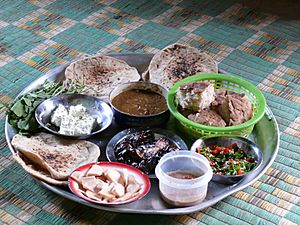Eish shamsi facts for kids

A rural breakfast accompanied by eish baladi and eish shamsi
|
|
| Type | Sourdough |
|---|---|
| Place of origin | Egypt |
| Region or state | Upper Egypt |
Eish shamsi (pronounced "eesh sham-see") is a special kind of thick bread from Egypt. It's made using a sourdough starter, which gives it a unique tangy flavor. In a part of Egypt called Upper Egypt, this bread is a main food for many families. It's often eaten instead of another common bread called eish baladi. The name "Eish shamsi" means "sun bread." This is because the dough is traditionally left to rise in the warm sun.
Contents
Baking Eish Shamsi
For a long time, Eish shamsi was baked at home. People used special round clay ovens with an opening at the top. These ovens helped the bread cook perfectly. Today, it's becoming more common to buy Eish shamsi from bakeries. But many families still enjoy making it the traditional way.
The Unique Shapes of Eish Shamsi
Eish shamsi has interesting shapes. These shapes are made by carefully cutting the dough with a needle before baking.
Common Shapes
- One common way is to make small cuts all around the top edge. This creates a round loaf of bread.
- Another way is to make cuts that look like crescent moons. This makes the bread turn out in a triangle shape.
Special Cross Shape
Some Christians in Egypt make cuts that form a rough cross shape on their bread. These special bread shapes look like the bread shown in ancient Egyptian tomb paintings. This shows how old this tradition is!
Where to Find Eish Shamsi
Even though Eish shamsi is most common in Upper Egypt, you can sometimes find it in other places. Some bakeries in Cairo make it especially for their customers from Upper Egypt.
See also
 In Spanish: Eish shamsi para niños
In Spanish: Eish shamsi para niños
 | Emma Amos |
 | Edward Mitchell Bannister |
 | Larry D. Alexander |
 | Ernie Barnes |

